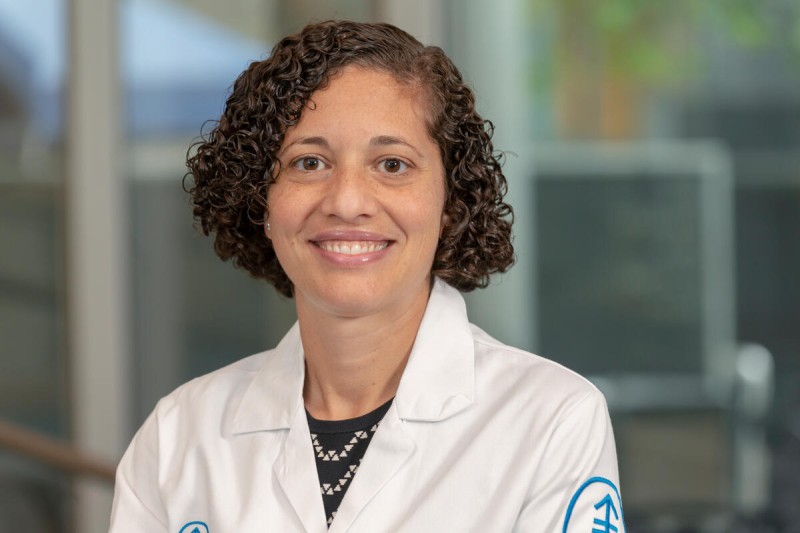
Dr. Sandra D'Angelo is focused on developing immunotherapy treatments for soft tissue sarcoma.
A new type of immunotherapy shows potential for treating solid tumors — a step toward solving a major challenge in cancer treatment. Most cell therapies involve reengineering an immune cell to recognize and attack a cancer cell. So far, these types of immunotherapies have been used only to treat certain types of blood cancer.
Now, a phase 2 clinical trial testing an experimental cell therapy called afamitresgene autoleucel (afami-cel) found that it significantly shrank sarcoma tumors in more than one-third of patients. (Sarcomas are cancers of the body’s soft tissues.) Memorial Sloan Kettering Cancer Center (MSK) sarcoma specialist and immunotherapy expert Sandra D’Angelo, MD, led the study, which was published March 27, 2024, in The Lancet.
“Some patients in the trial had their tumors completely disappear and have not had the cancer come back for several years,” Dr. D’Angelo says.
Results of Trial for Rare Soft Tissue Sarcomas
The clinical trial published in The Lancet was an international study that treated a total of 52 people who had been diagnosed with synovial sarcoma and myxoid/round cell liposarcoma (MRCLS), two types of sarcoma. These patients had not responded to other therapies.
- Overall, almost 37% of patients saw their tumors shrink after receiving a single dose.
- The drug helped about 39% of people with synovial sarcoma and 25% of people with MRCLS.
“These findings are significant for a group of patients who have largely exhausted other treatment options,” Dr. D’Angelo says. Patients with synovial sarcoma responded to this therapy for an average of 11.6 months, and those with MRCLS responded for an average of 4.2 months.
Side Effects of Afami-Cel for Sarcoma
Before receiving the cell therapy afami-cel, patients were first treated with chemotherapy. The most frequent side effect of that treatment was low blood counts.
About 71% of patients in the trial also experienced cytokine release syndrome (CRS), a common reaction after cell therapies. This occurs when the immune system temporarily goes into overdrive to fight the cancer. For most patients in the afami-cel trial, CRS was not severe.
T Cell Receptor Therapy Targets Solid Tumors
Afami-cel is an engineered cell therapy, similar to the chimeric antigen receptor (CAR) T cell treatments that have been approved for treating certain blood cancers since 2017. With cell therapies, a patient’s own T cells (a type of white blood cell) are collected from the blood and engineered in a lab to recognize cancer cells. They are then infused back into the bloodstream, allowing them to travel throughout the body to detect and destroy tumor cells.
Engineered cell therapies are often called “living drugs,” and for many people with blood cancer, they have offered the hope of a cure.
Afami-cel is not a CAR T therapy but is in a related category called T cell receptor (TCR) therapy. The T cells are engineered to carry an extra tool that allows them to recognize rogue proteins, or markers, that are hiding inside cancer cells. By contrast, CAR T therapies can only see these cancer markers when they are on the outside of tumor cells.
“With both CAR T and TCR therapies, you are giving the immune cells the ability to fight the cancer,” Dr. D’Angelo explains. “But with TCR, the cell engineering is more complex.” The cancer-causing protein that afami-cel targets is called MAGE-A4.
Expanding Treatment Options for People With Sarcoma
“Sarcoma is a type of cancer where more treatments are needed,” Dr. D’Angelo explains. “Once the disease spreads to other parts of the body, it is very difficult to control with the therapies we have now.”
Afami-cel is currently being reviewed by the Food and Drug Administration (FDA) for the treatment of synovial sarcoma. The FDA recently granted a priority review designation for the therapy. There are plans to expand the trial to include more patients. Dr. D’Angelo hopes that eventually afami-cel may prove to be useful against any type of solid tumor that carries the mutated MAGE-A4 protein.
Afami-cel and other TCR therapies are also being studied in pediatric sarcomas.
